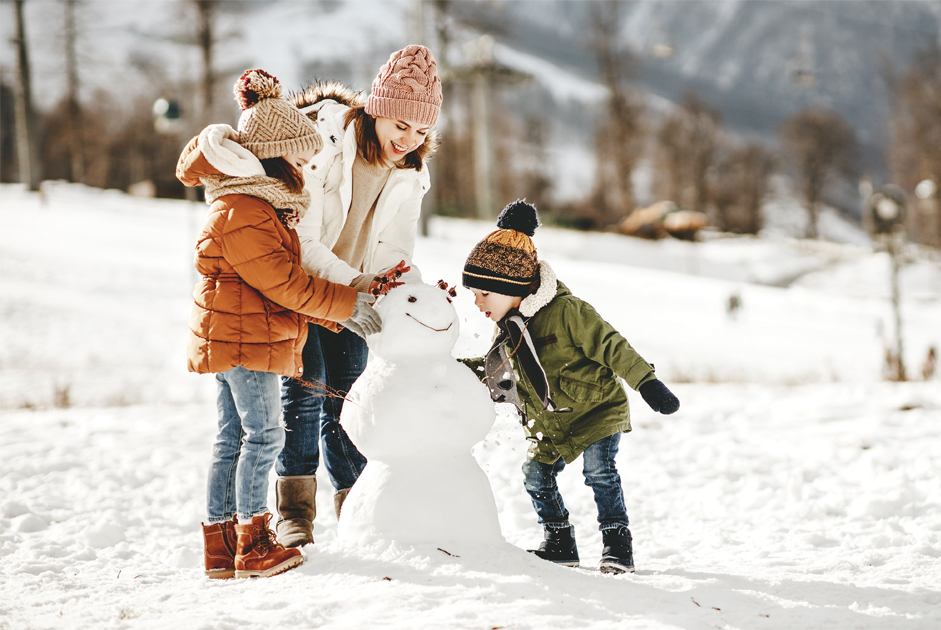Each month, this series will provide important facts and tips surrounding child safety in an effort to support parents and caregivers as they navigate reducing risks and creating the safest environment possible for the children in their lives.
Living in North Carolina, we tend to get the best of both worlds; getting to experience all four seasons throughout the year, without winter being too treacherous! However, that doesn’t mean we don’t still experience our fair share of colder climates and snowy conditions a few months of the year! While there’s something magical about living in a winter wonderland for kids, the truth is the colder weather comes with risk assessment and precautions to keep our youngest loved ones healthy and safe.
Winter Weather Travel Preparedness
Make it a priority and part of your routine to check weather reports daily, especially when traveling, to avoid risks when traveling with your kiddos in the winter. Take precautions when driving to your destination to make sure your vehicle is serviced with safe tires, ample fuel and an emergency kit with items like a flashlight, snow chains, gloves and more when it’s snowy or icy on the roads. Have car chargers available for GPS devices and smart phones and a phone number saved for towing services like AAA. If you’re traveling far distances to see friends or family, consider letting them know your route and your expected time of arrival in case of emergencies. Be proactive and keep a warm blanket, water and snacks in the event of car problems and being stuck without heat for prolonged periods.
Appropriate Cold Weather Clothing
One of the key elements in safeguarding children during colder months is ensuring they are dressed appropriately for winter weather. Layering is the most practical approach, so you can make adjustments throughout the day or during play as outdoor and body temperatures change. You can start with a moisture-wicking base layer to keep sweat away from the skin, followed by an insulating layer to trap warmth and finish with a waterproof and wind-resistant outer layer to protect against the elements. Don’t forget accessories like hats, gloves, scarves and insulated boots to keep your kids warm and dry. (Be sure to label these items if going to school or play dates to avoid being left behind or going home with the wrong child!)
Stay Hydrated and Nourished
In cold weather, children and parents may not prioritize hydration the same way they would in the summer months. Be sure to encourage regular fluid intake even when children don’t seem thirsty. You can provide warm beverages like hot cocoa and tea to help increase body heat during outdoor activities. Keep them well nourished with snacks that provide good fuel such as trail mix, granola bars and whole-grain crackers with a cheese stick! Ideal snacks will be a balance of carbohydrates, proteins and healthy fats, ensuring a quick energy boost. Additionally, plan out a few winter-friendly meals for your kids that have a good blend of nutrition benefits and keep them warm such as soups, stews and casseroles.
Create Winter-Related Risk Adversity in Children
While winter brings opportunities for fun activities like snowball fights and sledding, it’s crucial to balance the excitement with an awareness of potential risks. Supervision is always key to safety, but you want to help raise kids with a healthy dose of risk adversity through education. Find age-appropriate ways to teach your kids about the importance of staying on designated paths and avoiding areas with thin ice and uneven surfaces, and identify unsafe play. Help them to learn how to read their bodies and know if the temperature is too cold and they need to come indoors and take a break when playing. Overall, you want them to learn how to play an active role in their own safety.
Take Action if Injury or Accidents Occur
Always have a first-aid kit easily accessible as well as any important documents such as lists of medications your child is currently taking and phone numbers for contact information for pediatricians and emergency contacts. If you are unsure about the severity or care of an injury but have concern, don’t wait to head to your nearest emergency room or call 911.
Helpful Resources to Learn More
- Safe Kids Worldwide – safekids.org
- North Carolina Department of Public Safety























